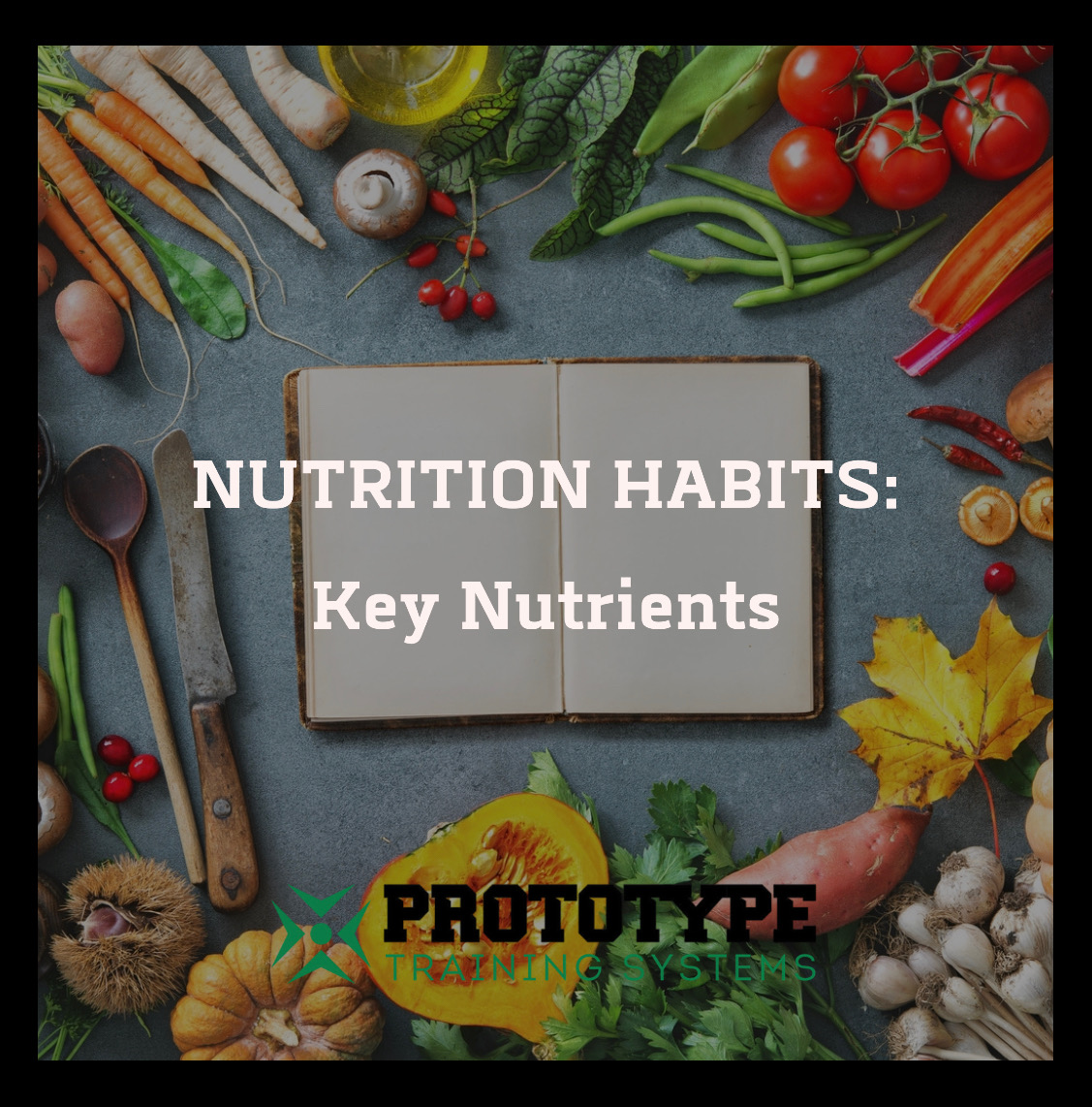Nutrition Habits: What are the Key Nutrients?
By: Jon Collette (Prototype Nutrition Coach)

In part 2 our nutrition series, we will be outlining and going in-depth about the fuel we put into our bodies! Specifically, the role key nutrients play in a healthy diet, what they do, and, what they are!
So, what are Key Nutrients?
Simply put, they are the major nutrients you put in your body that give us ENERGY or SUPPORT CONVERTING ENERGY. They are your:
-
Proteins
-
Carbohydrates
-
Fats
-
and Micro-nutrients (vitamins & minerals)
The first 3, (Protein, carbohydrates, and fats) are what are called your macronutrients. These contain the calories that give us energy (alcohol does as well, but that’s beyond the scope of this!). They are also responsible for adding additional lbs to the scale if taken in excess of what you burn off. But let’s talk more about them!
What is Protein?
-
They are the building blocks of our tissues (muscle, bone, organs, muscle tissue, brain, skin hair, and nails) and everything in our body needs protein to grow and repair.
-
Keeps us healthy, strong increases recovery from exercise-induced stress.
-
Supports growth & development.
-
Contains 4 calories per gram (so 20g of protein=80 calories)
*Fun fact: Protein requires the most amount of energy (calories) for your body to break it down. The breakdown, processing, and storing of food in your body is called the thermic effect of food (TEF). TEF accounts for 5-15% of all the calories you burn per day (based on how much and what you eat). So basically, the more protein you take in, the more calories you will burn just to process and break it down.
What are Carbohydrates?
-
The main fuel source for our body and brain.
-
The quickest energy source that supports exercise.
-
Fiber (a type of carbohydrate the body can’t digest. Also soluble & insoluble) have benefits on gut health, cardiovascular health and helps support stable blood sugar levels.
-
Athletes training at a high level should have higher carb intakes than most sedentary individuals for optimal performance.
-
Like protein, they contain 4 calories per gram (so 20g of carbohydrates=80 calories)
*Fun Fact: Carbs are not the independent source of weight gain AND not all carbs are equal BUT with a balanced nutrition plan, you can fit just about any kind of carb source into your daily diet.
What is fat?
- Gives you energy and supports cell growth.
-
Supports joint health (anti-inflammatory fats like omega 3).
-
Enhances Cognitive function.
-
Allows the absorption of fat-soluble vitamins (A,D,E,K).
-
Contains 9 calories per gram (so 20g of fat=180 calories).
*Fun Fact: 1lb of fat=3,500 calories. That is how much energy is in 1lb of fat. It also means that it will take an excess of 3,500 calories to lose a pound of fat.
What are Vitamins & Minerals?
-
Support overall optimal function to keep us alive
-
Help keep our immune system strong, protects us from viruses and disease.
- Helps to convert the food we eat (Macronutrients) into energy.
*Fun Fact: A popular google search is “can you overdose from taking too many vitamins?”. Answer: it’s really hard to take too many vitamins to cause issues. Typically, if you’re consuming your vitamins through food, you have no worries. The risk is taking them in major high doses, over time, in concentrated form (like multivitamins). Also, it’s REALLY HARD to have any issues with the water-soluble vitamins as they would just be excreted. On the other hand, the fat-soluble ones you have a higher risk, but it would have to be done in large amounts consistently overtime.
As you can see, all of these key nutrients play a vital role in our health and wellness. No one is particularly better than the other and overall, our body can suffer if we are depleting ourselves of one or more of these.
For example, popular diet fads and misinformation that has spread through the media has demonized carbohydrates. The reality is, carbohydrates are our bodies preferred fuel source for energy. While it’s true that carbohydrates aren’t essential for us to live (you don’t need to eat carbs to stay alive, your body can convert other nutrients into this fuel source), the same can be said that stretching isn’t essential for us to exercise but it’s recommended to perform optimally OR to mitigate against injury.
What are the TOP foods that have the most of these Key nutrients?
Protein
-
Poultry
-
Steak (can have a lot of fat as well)
-
Ham
-
Fish
-
Egg whites
-
Dairy
Fats
-
Nuts
-
Seeds
-
Oils
-
Avocado
-
Butter/Nut butter
-
Egg yolk
Carbohydrates
-
Fruits
-
Vegetables
-
Oats
-
Bread
-
Pasta
-
Rice
-
Beans
The vitamins and minerals can be found in these macronutrient sources (carbs, fats, protein) but they don’t contain significant calories. Some foods like Nuts, Eggs, Steak, etc, contain a combination of different key nutrients. Steak for example is high protein but can also be high in saturated fats. This is good to know because that means this food source has a higher caloric content with less food volume. In other words, you don’t need to eat a lot of Steak to get your fill!
Key takeaways
-
All foods contain nutrients and can provide us with energy.
-
Each nutrient should be present in the diet for optimal health, proper growth/recovery, and healthy digestion.
-
Some foods have higher caloric content with less food volume.
Tune in next Wednesday to talk more about food selection!
